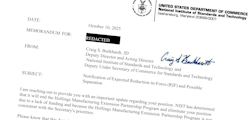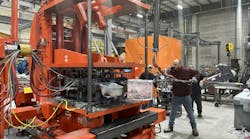Trump Administration Plans to Defund MEPs Next Year, Ignoring Congress’ Allocation
Key Highlights
- The Trump Administration failed to cut MEPs in April, but now plans to eliminate them, cutting the $212 million annual program in 2026.
- MEPs, or Manufacturing Extension Partnerships, are nonprofits in each state that help small and medium-sized U.S. manufacturers grow, providing help with skills training, certifications, lean and technology adoption and more.
- Some state MEPs have not received their federal payments for July and October and are laying off their staff.
- MEPs got their start in 1988 with President Ronald Reagan but their programming is updated to reflect industry needs and changes.
President Donald Trump is once again planning to defund Manufacturing Extension Partnerships. After drawing swift, bipartisan opposition to that plan in April, he backed down. But since then, the administration has failed to send checks to organizations for 2025 and is warning that all MEPs will be defunded in 2026.
The 50 Manufacturing Extension Partnerships, or MEPs, are nonprofit organizations that provide business development and support to small- and medium-sized manufacturers across the country. Some have cut staff and are not hiring for open positions as they wait for their payments, said Carrie Hines, president of the American Small Manufacturers Coalition, the trade association for MEPs.
An Oct. 10 letter from Craig Burkhardt, deputy director and acting director of the National Institute of Standards and Technology (NIST), stated that the agency has decided to end the federal Manufacturing Extension Partnership Program because “it is not consistent with the Secretary’s [Secretary of Commerce Howard Lutnick’s] priorities.”
“Please note that this decision was not made lightly,” the letter stated.
IndustryWeek reached out to Burkhardt about the letter. NIST confirmed the cuts through a spokesperson: “The president’s FY2026 budget request zeroes out funding for the MEP program.”
The statement added that NIST used 2025 funds to provide some MEPs with one year of funding.
Congress allocated the 2026 funding for MEPs last September, before the NIST announcement.
“When you have congressional intent saying the House and Senate plans to fund the program when the bill is enacted and you’re still continuing to try to shut it down, you’re just ignoring congressional intent,” Hines said.
‘No Longer in Alignment’
The October letter arrived after months of NIST notices to state MEPs that their programs were being defunded.
On April 1, when 10 state MEPs were due federal payments, they instead received warnings that they would no longer receive funds:
“As part of President Trump’s efforts to streamline and reduce the cost and size of the Federal Government and in accordance with the priorities to ‘secure its position as the unrivaled world leader in critical and emerging technologies such as artificial intelligence, quantum information science,’ NIST is reprioritizing its funding and staff to support efforts in research and programs targeting emerging technology priorities,” the April 1 letter stated. “As such, the funding of MEP centers is no longer in alignment with advancing the priorities of NIST.”
On April 15, the Trump administration restored those six-month payments but “continued to evaluate plans for the program.” Then, in his May 2025 budget recommendations, Trump again proposed eliminating the MEP program.
MEPs that were due to receive their six-month payments in July and October are still awaiting their federal funds.
“MEP is the engine of America’s small-manufacturer economy,” said Ethan Karp, president and CEO of Ohio MEP MAGNET. “Congress filled the tank. NIST just has to stop refusing to turn the key.”
Cuts and More Cuts
Launched in 1988, MEPs date to then-President Ronald Reagan’s administration, but their programming and mission has been updated over the decades. Trump’s attempts to cut the MEP program—which helps small and medium-sized manufacturers across the country grow their businesses and prepare for the future with new technology—date back to his 2017 budget recommendations, when he started proposing multimillion-dollar cuts to the program. Trump left MEPs entirely out of his proposed fiscal year 2020 and 2021 budget recommendations.
MEP Cuts 'Break the Backbone' of Manufacturing
Commentary by Ethan Karp, CEO of MAGNET, Ohio's MEP
MEPs are the only national program focused on helping small and mid-sized manufacturers modernize, adopt new technology, and stay competitive in a world shaped by rapid shifts like tariffs and AI. For many small manufacturers, MEP is the only affordable way to get the expertise they need to grow.
At MAGNET, these federal dollars fuel hundreds of projects each year that help manufacturers automate production lines, bring new products to market, train workers, and expand into global supply chains. Without MEP funding, our impact will shrink and small manufacturers across Northeast Ohio will feel it first. We’re fortunate that the State of Ohio also invests in this work, so MAGNET will continue operating, but our reach will be smaller and the region’s momentum will slow. Unfortunately, many of our peer MEP centers around the country don’t have that safety net.
What’s most frustrating is that Congress, on both sides of the aisle, has already spoken. Lawmakers in the House and Senate overwhelmingly support the MEP program and appropriated the money months ago. Thousands of manufacturers also stepped up this summer to tell lawmakers how essential this program is to their survival and growth. The need is there. The bipartisan support is there. The funding is there. What’s missing is action from NIST. We need NIST to sign the contracts and release the dollars Congress has already approved. Until NIST follows through and does this, MEP and manufacturers are stuck in limbo.
The future of American manufacturing depends on the strength of small and mid-sized firms. They make up 98% of our industry. They're the backbone of reshoring efforts and the first to feel the pressure of global volatility. Cutting or freezing the MEP program breaks that backbone. Restoring the funding is the simplest step Washington can take to keep American manufacturing strong, innovative, and resilient.
MEPs were included in Project 2025, a series of policy statements from conservative groups to serve as a policy guideline for a second Trump presidency, as a program to “privatize.” Trump distanced himself from Project 2025 during the presidential campaign last year but has followed many of its recommendations.
The wording of the policy is important, said Hines. “'Eliminate' insinuates there isn't a need. 'Privatize' insinuates that there is a need, just not one for the government to have a role/provide. The problem is, if the government doesn’t provide it to small, rural (and other) manufacturers, no one will.”
At a Senate budget hearing on June 2, 2025, Commerce Secretary Howard Lutnick stated that the MEP programs, “set up by the Department of Commerce decades ago to assist in technology for manufacturing tend to be outdated.
“The new technology is AI-driven, automated,” Lutnick continued. “I think we need to re-examine and retool a whole variety of these programs so that we are able to provide the best technological assistance rather than just continuing a program that’s decades and decades old. So I’m very focused, and our department is very focused, on making sure we’re bringing our manufacturers the best tools and we’re examining them.”
Hines says what’s lacking here is the administration’s grasp of manufacturing’s real challenges and what it takes to run and scale up small- to medium-sized manufacturing businesses. MAGNET, for instance, helps manufacturers increase capacity and efficiency, minimize supply-chain disruptions and upskill workers, along with implementing automation and digital tools. MEPs help with plant layout, lean manufacturing and ISO and cybersecurity certifications that help manufacturers gain new business.
“You can’t just go into a plant and implement AI if they don’t have a somewhat lean facility or don’t have the training to support the employees to implement AI,” said Hines, who calls the MEP network “a small program that’s extremely impactful.”
Amid the uncertainty, Hines tells her membership, “‘Stay engaged. Don’t forget who you do it for. When it gets to be a lot, go out there and remember why you’re doing it.’ I think that’s critically important for the bread-and-butter manufacturers of this country [to hear]. They are really amazing.”
More MEP Defunding Coverage
About the Author

Laura Putre
Senior Editor, IndustryWeek
As senior editor, Laura Putre works with IndustryWeek's editorial contributors and reports on leadership and the automotive industry as they relate to manufacturing. She joined IndustryWeek in 2015 as a staff writer covering workforce issues.
Prior to IndustryWeek, Laura reported on the healthcare industry and covered local news. She was the editor of the Chicago Journal and a staff writer for Cleveland Scene. Her national bylines include The Guardian, Slate, Pacific-Standard and The Root.
Laura was a National Press Foundation fellow in 2022.
Got a story idea? Reach out to Laura at [email protected]




